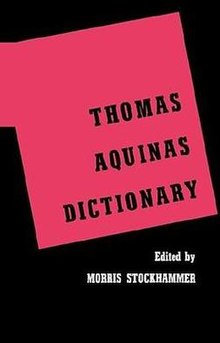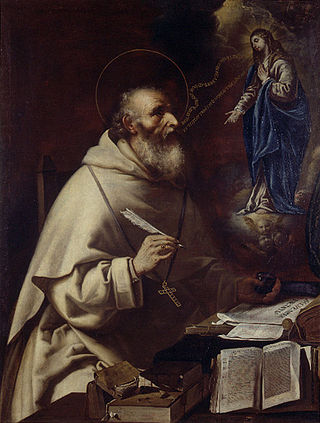
Albertus Magnus, also known as Saint Albert the Great, Albert of Swabia or Albert of Cologne, was a German Dominican friar, philosopher, scientist, and bishop. Canonized in 1931 as a Catholic saint, he was known during his lifetime as Doctor universalis and Doctor expertus; late in his life the sobriquet Magnus was appended to his name. Scholars such as James A. Weisheipl and Joachim R. Söder have referred to him as the greatest German philosopher and theologian of the Middle Ages. The Catholic Church distinguishes him as one of the 37 Doctors of the Church.

Frederick Charles Copleston was an English Roman Catholic Jesuit priest, philosopher, and historian of philosophy, best known for his influential multi-volume A History of Philosophy (1946–75).

The Summa contra Gentiles is one of the best-known treatises by Thomas Aquinas, written as four books between 1259 and 1265.

Thomism is the philosophical and theological school which arose as a legacy of the work and thought of Thomas Aquinas (1225–1274), the Dominican philosopher, theologian, and Doctor of the Church.

The Summa Theologiae or Summa Theologica, often referred to simply as the Summa, is the best-known work of Thomas Aquinas (1225–1274), a scholastic theologian and Doctor of the Church. It is a compendium of all of the main theological teachings of the Catholic Church, intended to be an instructional guide for theology students, including seminarians and the literate laity. Presenting the reasoning for almost all points of Christian theology in the West, topics of the Summa follow the following cycle: God; Creation, Man; Man's purpose; Christ; the Sacraments; and back to God.
Summa and its diminutive summula was a medieval didactics literary genre written in Latin, born during the 12th century, and popularized in 13th century Europe. In its simplest sense, they might be considered texts that 'sum up' knowledge in a field, such as the compendiums of theology, philosophy and canon law. Their function during the Middle Ages was largely as manuals or handbooks of necessary knowledge used by individuals who would not advance their studies any further.
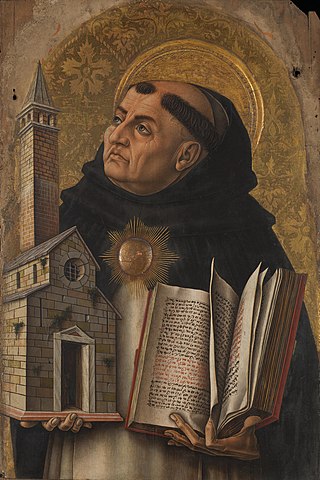
The Quinque viæ are five logical arguments for the existence of God summarized by the 13th-century Catholic philosopher and theologian Thomas Aquinas in his book Summa Theologica. They are:
- the argument from "first mover";
- the argument from universal causation;
- the argument from contingency;
- the argument from degree;
- the argument from final cause or ends.
In medieval philosophy, the active intellect is the formal (morphe) aspect of the intellect (nous), according to the Aristotelian theory of hylomorphism. The nature of the active intellect was a major theme of late classical and medieval philosophy. Various thinkers sought to reconcile their commitment to Aristotle's account of the body and soul to their own theological commitments. At stake in particular was in what way Aristotle's account of an incorporeal soul might contribute to understanding of deity and creation.
The argument from degrees, also known as the degrees of perfection argument or the henological argument is an argument for the existence of God first proposed by mediaeval Roman Catholic theologian Thomas Aquinas as one of the five ways to philosophically argue in favour of God's existence in his Summa Theologica. It is based on ontological and theological notions of perfection. Contemporary Thomist scholars are often in disagreement on the metaphysical justification for this proof. According to Edward Feser, the metaphysics involved in the argument has more to do with Aristotle than Plato; hence, while the argument presupposes realism about universals and abstract objects, it would be more accurate to say Aquinas is thinking of Aristotelian realism and not Platonic realism per se.
Francesco Silvestri, O.P. was an Italian Dominican theologian. He wrote a notable commentary on Thomas of Aquinas's Summa contra gentiles, and served as Master General of his order from 1525 until his death.
A summa is a text that sums up knowledge in a field, such as:

Thomas Aquinas was an Italian Dominican friar and priest, an influential philosopher and theologian, and a jurist in the tradition of scholasticism from the county of Aquino in the Kingdom of Sicily.
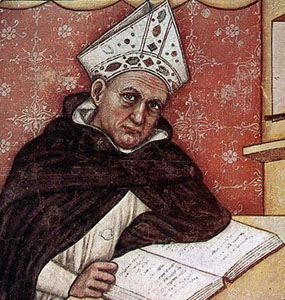
In scholastic philosophy, the aevum is the temporal mode of existence experienced by angels and by the saints in heaven. In some ways, it is a state that logically lies between the eternity (timelessness) of God and the temporal experience of material beings. It is sometimes referred to as "improper eternity".

Medieval philosophy is the philosophy that existed through the Middle Ages, the period roughly extending from the fall of the Western Roman Empire in the 5th century until after the Renaissance in the 13th and 14th centuries. Medieval philosophy, understood as a project of independent philosophical inquiry, began in Baghdad, in the middle of the 8th century, and in France, in the itinerant court of Charlemagne, in the last quarter of the 8th century. It is defined partly by the process of rediscovering the ancient culture developed in Greece and Rome during the Classical period, and partly by the need to address theological problems and to integrate sacred doctrine with secular learning. This is one of the defining characteristics in this time period. Understanding God was the focal point of study of the philosophers at that time, Muslim and Christian alike.
James Francis Ross was an American philosopher. James Ross, a creative thinker in philosophy of religion, law, metaphysics and philosophy of mind, was a member of the Philosophy Department at the University of Pennsylvania from 1962 until his death. He published widely.
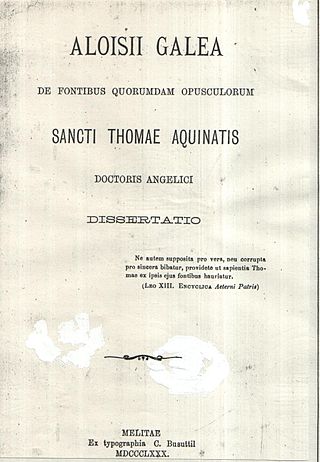
Aloisio Galea (1851–1905) was a Maltese theologian and minor philosopher. He specialised mostly in moral philosophy.
John Francis Wippel was an American Catholic priest of the Diocese of Steubenville. He was a leading authority on the metaphysical thought of Thomas Aquinas. He won the Cardinal Mercier Prize for International Philosophy in 1981, two National Endowment for the Humanities Fellowships, and was named a Professor of the Pontifical Academy of Saint Thomas Aquinas. At the time of his death, he was serving as the Theodore Basselin Professor of Philosophy at the Catholic University of America in Washington, DC.

Treatise on Law is Thomas Aquinas' major work of legal philosophy. It forms questions 90–108 of the Prima Secundæ of the Summa Theologiæ, Aquinas' masterwork of Scholastic philosophical theology. Along with Aristotelianism, it forms the basis for the legal theory of Catholic canon law.

The Cambridge Companion to Aquinas is a book edited by the American philosophers Norman Kretzmann and Eleonore Stump. A reference work, it features a number of writers who provides scholarly essays on the thoughts of the Italian Catholic philosopher and theologian Thomas Aquinas, collectively known as Thomism. The book was published on 28 May 1993 by Cambridge University Press. It received mixed responses from critics for being more focused to Aquinas' philosophy rather than his theology but has been deemed a valuable guide to the beginners by some.
